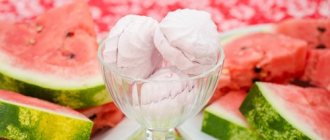Blueberries, the beneficial properties of which are undeniable, not only have a pleasant taste, but also contain a large amount of vitamins and microelements. It can be consumed either fresh or as one of the ingredients in various dishes. At the same time, not everyone can eat it: the berry has some contraindications.
On this topic:
Description of the blueberry variety Divnaya to help diligent gardeners
Aug 29, 2020
What care does Northland highbush blueberry need?
Aug 25, 2020
Varietal characteristics of Toro blueberries - why they are better...
Aug 15, 2019
Blueberry propagation is a delicate matter, but rewarding.
Jun 11, 2019
BACK FORWARD 1 of 5
Vitamins contained in blueberries
The berries consist of a rich vitamin and mineral complex.

The fruits and leaves of the crop contain the following useful components:
| Vitamin A | This substance is necessary to regulate the functioning of the sebaceous glands of the skin and is a prevention of cancer. |
| Vitamins B1 and B2 | Organic compound B1 has a positive effect on the nervous and digestive systems. Vitamin B2 is involved in the metabolism of fats, carbohydrates and proteins. It also improves the condition of the visual system |
| Vitamin C | Strengthens the human immune system, allowing it to fight viral infections |
| Vitamin PP | Participates in regulating blood cholesterol and detoxifying the body |
| Vitamin K | Necessary for normal blood clotting |
Nutritional value of blueberries per 100 g of product: proteins - 1 g; fats - 0.5 g; carbohydrates - 6.5 g. Total calorie content - 39 kcal.
If we consider the chemical composition of the fetus, the presence of:
- calcium: 1.6%;
- magnesium: 1.8%;
- potassium: 2%;
- phosphorus: 1%;
- acids (malic, nicotinic, oxalic, citric);
- antioxidants.
Did you know? After the Chernobyl accident, doctors recommended eating berries every day, as they remove all radioactive substances from the body.
Benefits of berries

Blueberries contain many beneficial substances. This:
- mineral salts;
- pectin;
- magnesium;
- iron;
- vitamins A, E, C, PP.
The listed elements have a beneficial effect on overall health: they help strengthen the immune system, make the walls of blood vessels stronger and improve blood circulation, and reduce the amount of cholesterol in the blood.
Magnesium contained in berries improves the functioning of the nervous system.
Experts have proven that blueberries have anti-inflammatory and antipyretic effects.
Berries are also useful for various diseases. The beneficial properties of blueberries for diabetes are that they can reduce the amount of glucose in the blood.
On this topic:
Diseases and pests of blueberries: tips for beginners...
Dec 24, 2018
The difference between blueberries and blueberries: a big difference between the two berries
Sep 21, 2018
BACK FORWARD 1 of 5
The berry has a positive effect on the human digestive system, cleansing the body of toxins and toxic substances, stimulating intestinal function. It is recommended to eat it not only for preventive purposes, but also as a remedy for disorders of the digestive system. Blueberries alleviate symptoms of constipation and diarrhea.
The advantages of this gift of nature are the provision of mild diuretic and choleretic effects, normalization of kidney and liver function.
Blueberries have a beneficial effect on vision, improving it.
In the northern regions, the berry is eaten as a prophylactic against such serious diseases as anemia and scurvy. It resists the pathogenic effect of the dysentery bacillus.
In the absence of contraindications, doctors recommend eating 1 glass of blueberries per day (ice cream or fresh). This amount of berries contains the required daily dose of nutrients.
In the course of studying the beneficial properties and contraindications of blueberries, scientists have proven the unique abilities of the berries to slow down the aging of the brain and effectively protect the body from the negative effects of radioactive radiation.
Beneficial properties for the body
Blueberries, like most berries, bring great benefits to the human body. Regular consumption of the fruits of this crop helps regulate the functioning of all internal systems (digestive, nervous, cardiovascular, etc.).

Due to their low calorie content, berries can be consumed by anyone who leads a healthy lifestyle and watches their diet. For an adult, the norm per day is 150 g.
blueberry leaves
Most people are convinced that only blueberries are enriched with vitamins and minerals. However, the leaves contain no less useful substances.
The medicinal properties of foliage include:
- fight germs, lower body temperature;
- strengthening the immune system;
- helps cope with constipation;
- reduction of cholesterol levels in the blood;
- compresses made from crushed leaves relieve heaviness in the eyes and relieve swelling;
- A drink made from leaf plates promotes the production of insulin, which lowers blood sugar.

Berries
The fruits contain a record amount of vitamins and minerals. Therefore, their regular consumption will help you prevent or stop the development of many diseases. If you eat berries 2 times a week (100 g each), you can normalize the functioning of the digestive system (improve metabolism and absorption of vitamins).
Important! The sour drink made from berries is recommended for colds and fever. It is more effective than lemon or cranberry tea.
Fruits help remove all radioactive metals from the body, which helps prevent cancer. The berries of this crop normalize the functioning of the pancreas, preventing the development of diabetes, ulcers and gastritis.
Regular consumption of fruits improves the formation of blood cells and strengthens the walls of blood vessels. Thanks to these properties, a person’s risk of developing Alzheimer’s disease, heart attack and stroke is reduced.

Blueberries are an ideal option for those involved in mental work. The benefits include improving memory and stimulating brain function. If you are familiar with the problem of hair loss, skin dehydration and constant dark circles under the eyes, then the fruits will help cope with these unpleasant symptoms.
Due to the fact that they help increase blood circulation in the body, within a few weeks you will notice an improvement in your appearance (your hair will become thicker and have a healthy shine, wrinkles on the skin will become less noticeable, and dark circles under the eyes will lighten).
We invite you to learn how to grow blueberries yourself.
Contraindications for use
- Despite the enormous benefits of blueberries for the human body, they have a number of contraindications:
- increased stomach acidity (gastritis and ulcers);
- allergic reaction (individual intolerance);
- breastfeeding (newborn babies have an undeveloped digestive system, which can lead to allergies).
People taking medications to reduce the number of blood clots are prohibited from consuming berries. This is due to the fact that blueberries help increase the viscosity of lymph. If you are at risk of developing a heart attack or stroke, it is best to avoid using it.
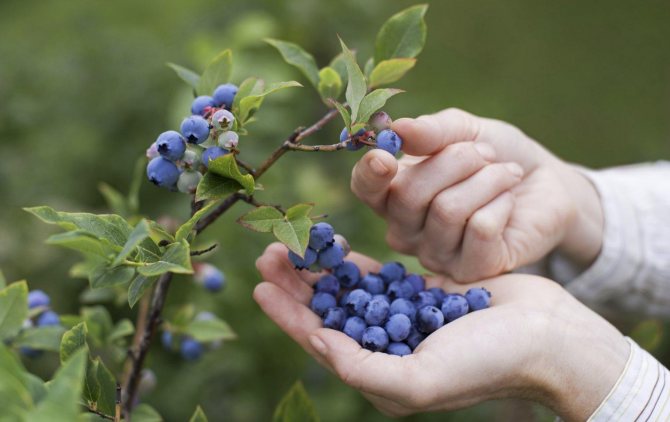
Harvest fruits from areas with high sustainability scores.
Blueberry bushes are able to absorb all negative substances in the soil. Eating such berries can cause harm to the body (bloating, headaches and nausea). Doctors prohibit combining blueberries with tea or coffee. When combined with caffeine, the berry becomes toxic. As a result, a person experiences headaches, vomiting and stomach pain.
Harm
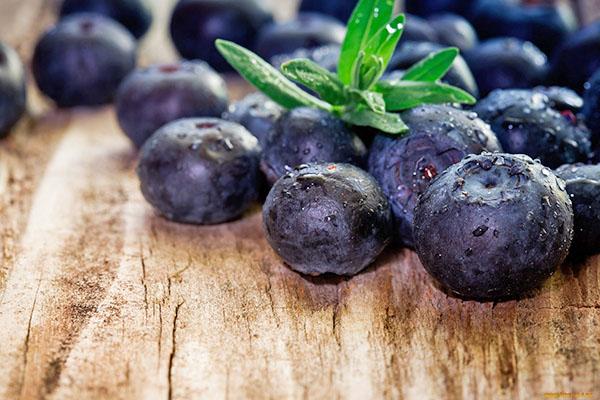
Despite their rich composition, blueberries can cause a deterioration in overall health. If you eat berries in large quantities (more than 500 grams), you may experience:
- diarrhea;
- bloating;
- gagging;
- headache.
If you overuse berries, the antioxidants they contain can reduce the amount of oxygen supplied to the muscles, which often causes poor health.
Children should not be given a lot of berries without first checking how the body reacts to them. When taking medications that thin the blood, blueberries can be dangerous, as they have the opposite effect.
Subject to moderate consumption, this natural product is not capable of causing harm to health.
Blueberries for women
The fruits have a positive effect on women's health. They participate in the normalization of the menstrual cycle and strengthen the walls of the internal genital organs, which reduces the number of bacteria.
If you have problem skin (regular inflammation on the face, rashes, dryness under the eyes), then eating berries will help you cope with unpleasant symptoms. Since they remove bile from the body, within a week you can get rid of swelling and dark bruises under the eyes.

During pregnancy
Blueberry fruits are a panacea for many diseases. During pregnancy, a woman can consume them, but in small quantities. If you introduce 30–40 g of the product into the daily diet, this will contribute to the development of bone tissue in the baby. Berries also help expectant mothers maintain healthy hair, skin and nails after childbirth.
The iron contained in berries promotes the breakdown of fats and weight loss (relevant for pregnant women and after childbirth). Blueberries contain folic acid, which is necessary for pregnant women. It normalizes hormonal levels and protects against depression.
Important! Try not to exceed the recommended amount of fruit, so as not to provoke allergic reactions.
GW
During breastfeeding, you can eat berries, but in minimal quantities. Remember that all nutrients enter the baby’s body with mother’s milk. If you eat excessive amounts of blueberries, your baby may experience intoxication, rashes and redness on the skin.

When breastfeeding, it is recommended to consume 20–30 g of product per day. This will be enough to enrich milk with beneficial vitamins.
Precautionary measures
There are practically no contraindications to including blueberries in the daily diet, with the exception of individual intolerance. Studies have shown the absence of allergens in the berry, so nursing mothers can start consuming it three months after the birth of their newborn.
Before the baby reaches the age of three months, the mother should not eat blueberries because of the active components in the composition, which have a strong effect on the body and can cause digestive problems in the baby.
Read also Simple prune wine at home
An adult should not eat more than 400-500 grams of blueberries at one time. This leads to disturbances in the absorption of food, increased gas formation, and diarrhea.
During breastfeeding, blueberries are introduced into the menu gradually, starting with a small amount of berries eaten in the morning an hour or two before feeding the baby. It is important to observe the baby’s behavior, his digestion, mucous membranes and skin.

If allergy symptoms do not appear within two days, there is no increased gas formation or colic, the serving size is gradually increased to 100 grams of berries per day.
Blueberries for children
Blueberry fruits help strengthen the immune system, which is important for children who like to walk outside even in cold weather. A child should consume at least 70–80 g of berries per day.
- Blueberries not only improve immunity, but also have a positive effect on other systems of the child’s body:
- participates in the formation of bone tissue;
- strengthens tooth enamel;
- increases blood clotting.

Introduce them into your diet gradually to avoid causing intolerance in the future. Start with 10 g per day, increasing the amount every week.
The use of blueberries in folk medicine
Berries are quite popular. They are used in folk medicine because they help fight common diseases at home. If you collect the fruits during the period of full ripening and make a decoction from them, then it can be used for anemia, sore throat, stomatitis or dermatitis.
To prepare the tincture you need to pour 2 tbsp. l. berries with a glass of warm water (temperature from +25°C to +30°C). Let it brew for 15 minutes and drink half an hour before meals.
During flowering, blueberry leaves are collected to make a decoction that helps with anemia or diabetes. Regular face masks made from berries help improve skin color, eliminate fine expression wrinkles and eliminate inflammation.
Did you know? At the beginning of the 21st century, an experiment was conducted in the USA, the essence of which was the daily consumption of 200 g of blueberries. Over the course of 2 weeks, the subjects improved their memory and mental activity.
Application
Fresh berries are considered to have the most beneficial properties. It can be eaten separately or as part of a fruit mix, or made into jam. Dried berries are good for baking pies, and decoctions of leaves in the form of tea can be used for vitamin and cold therapy. It’s good to freeze them for the winter, make canned mousses, compotes, jellies, and prepare dried fruits. You can make face masks, scrubs, and peels from fresh berries.
Article on the topic: Left atrial hypertrophy - causes and symptoms of the disease, diagnosis, treatment methods and prognosis
Blueberry Recipes
There are a huge number of different recipes from this medicinal plant, which has been popular for many years:
- Morse. To prepare the drink, you need to rinse 300 g of berries under running water and place them in a deep container. Mash the fruits with your hands until the juice appears. Add 200 g of sugar and pour 3 liters of boiling water (from +90°C to +95°C). Place on low heat and simmer for 5 minutes. After this, leave the drink to cool. After 2-3 hours, it needs to be strained through a sieve and bottled. It is recommended to store fruit juice in the refrigerator (at a temperature from +1°C to +8°C).
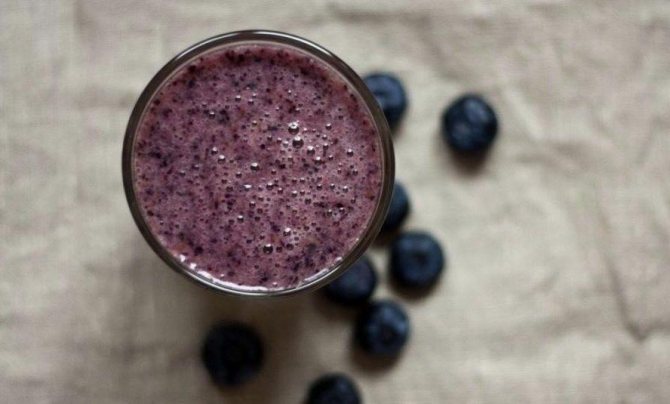
- Kissel. To prepare a delicious dessert, you need to rub 200 g of blueberries through a sieve. Pour the mixture into 1 liter of boiling water (+90°C) and cook for 5 minutes. Strain the broth and add sugar. Place on low heat and cook for another 10 minutes. In a separate container, mix 1 tbsp. l. starch and 1 glass of cold water. Add the contents to the syrup. After boiling, remove the container from the heat and leave to brew for 20 minutes. It is better to serve cooked jelly cold.
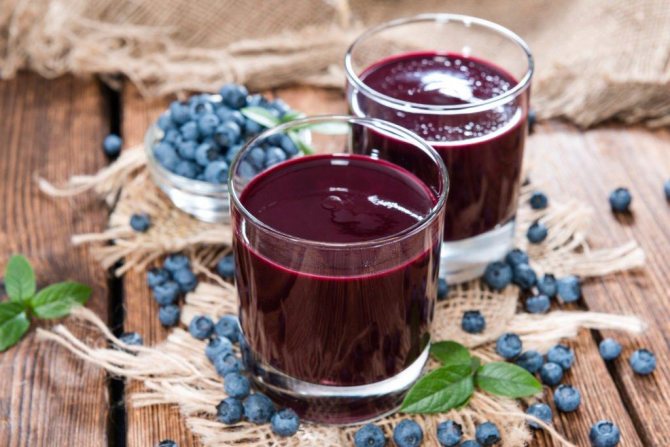
- Jam. First you need to prepare the syrup. To do this, pour 4 glasses of sugar into 1 liter of water and put on low heat. Then 1 kg of berries are washed and dried. Add the fruits to the syrup and cook for 20 minutes. Skim off the foam during cooking to keep the jam longer. Distribute the dessert into sterilized jars and secure with tin lids. Leave the containers with the lids down for 24 hours until completely cooled. You can store the jam in the refrigerator or pantry. The optimal temperature is from +3°C to +15°C.
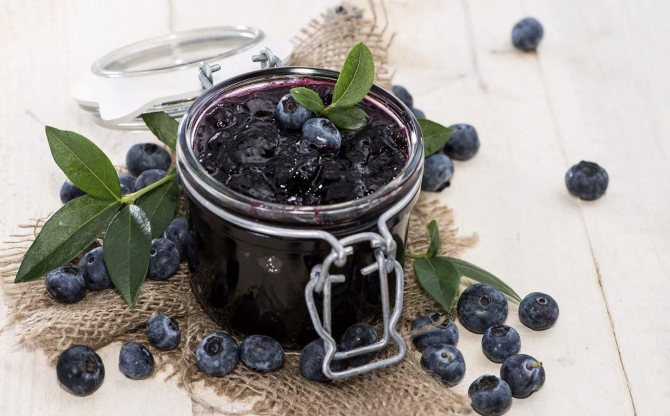
Blueberry bushes can do more than just decorate your garden. The leaves and berries of this crop help fight many diseases: colds, diabetes and oncology. To benefit your body, try not to exceed the recommended daily intake of blueberries. Otherwise, you can provoke an allergic reaction and food poisoning.







